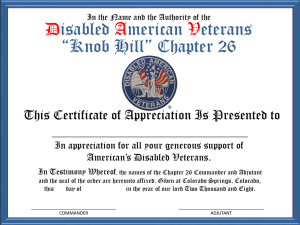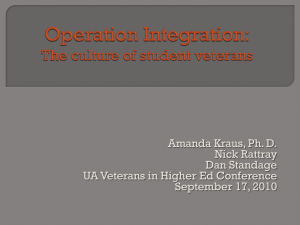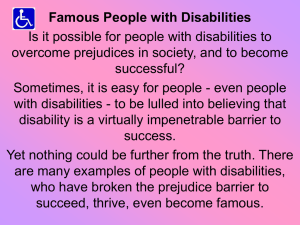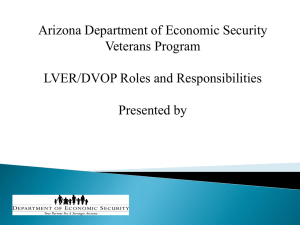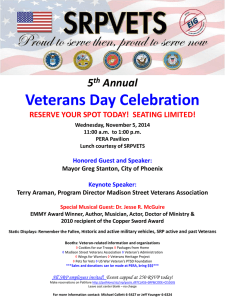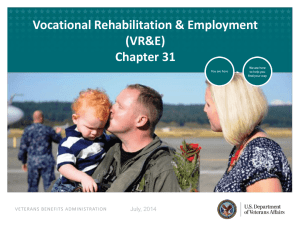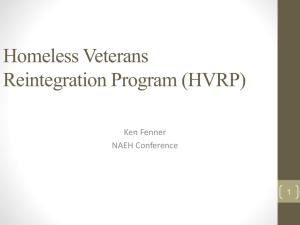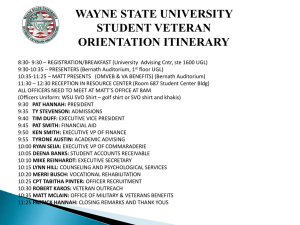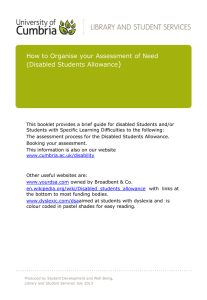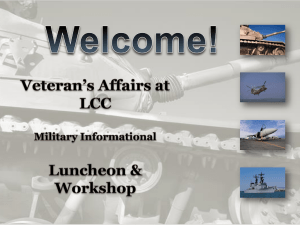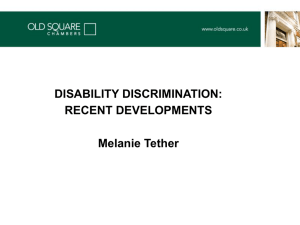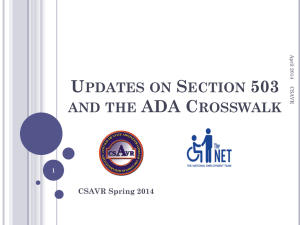Disability Politics and Veterans with Disabilities
advertisement
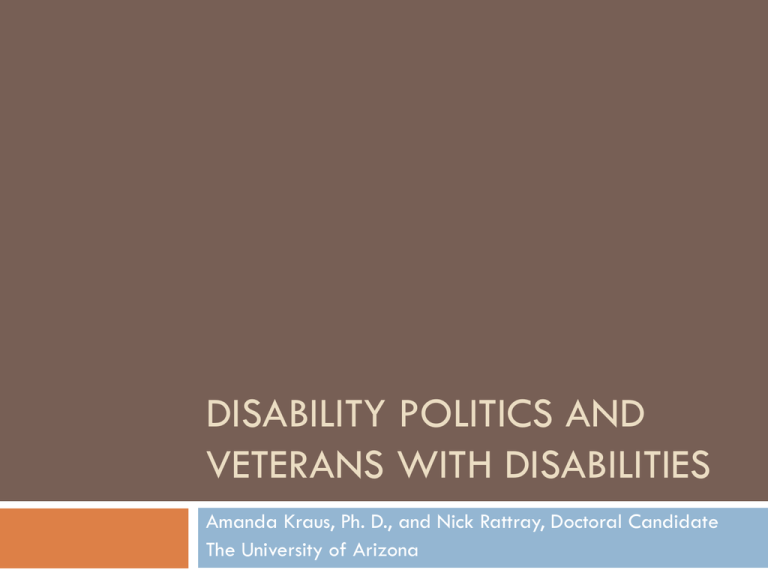
DISABILITY POLITICS AND VETERANS WITH DISABILITIES Amanda Kraus, Ph. D., and Nick Rattray, Doctoral Candidate The University of Arizona Abstract Using data from the Disabled Veterans Reintegration and Education Project at the University of Arizona, this presentation will discuss how experiences of disability are influenced by military service, the intersections of veteran and disability identity, and associated developmental processes. Implications for the larger disability community and higher education will be explored. University of Arizona trends Disabled Veterans Reintegration and Education Project Goal to more authentically understand how disabled veterans experience higher education Historical shifts in perceptions of veterans and disabled veterans Vietnam: 3 to 1 injury to casualty OEF/OIF: 16 to 1 injury to casualty (under-reported) $4-6 billion in mental health costs – VA top priority Produce a model with recommendations on strategies that contribute to the success of veterans on campus Four year Congressionally-directed grant Disabled Veterans Reintegration and Education Project Research Participatory-action research and mixed qualitative methodology 35 individual, semi-structured interviews Outreach Professionals’ Roundtable Sports and Wellness Camp Liaise with Student Vets Center and campus and community Academic initiatives SERV Online faculty resources Direct Services DRC accommodations Healing Touch Impact of DVRE 20092010 20102011 Initiative Total Sports and Wellness Camp Individual interviews n/a 22 20 62 23 12 35 Healing Touch n/a 47 51 98 DRC Accommodations SERV classes 6 15 26 47 8 24 27 59 Student Veterans Center Student Veterans of America club Annual Total 125 225 250 600 100 200 200 500 259 553 586 1401 Initiative 20082009 20 Finest of the Finest: Injured in Service “Veterans are the finest citizens, and disabled veterans are the finest of the finest” or two times a citizen: ‘military citizenship,’ a new form of identity” (Messinger, 2008). Identity Formation: Disabled student veterans Hierarchy of disability and service Insiders ascribe value to how one becomes injured or disabled VA ratings Determine benefits, may not match personal identification Identity quotes “I’ve been avoiding the Disability Resource Center (DRC) like it was the plague” “Well, I got PTSD. They gave me that last year or so. Back and knees and just basic joint stuff. Well, I got actually—not too long ago I got diagnosed with a mild TBI just from getting tossed around the back of a truck, hit with a couple explosions, but that’s about it. No puncture wounds or gun shots or anything like that.” Identity quotes “Do you identify as a person with a disability?” I’m finding it hard to identify that way. I’m just now–you saw me in the DRC, and I’m just now finally saying, “Yeah, I can’t learn as well as I used to be able to,” so it’s like–I guess yes-ish, I guess they’re getting me.” Deceased Combat-related Official recognition (i.e. Purple Heart) Service-connected Combat Theatre Visible injuries or disabilities Living Non-combat-related Unrecognized Non-Service-related (e.g. skiing accident) Stateside or other non-combat location Invisible (including physical, learning disabilities, psychological, TBIs ) Resources for veterans and nonveterans Resource distribution Rehabilitation and products that other disabled people cannot access, do not deserve Disability disqualifies from military service Creates divide in vets community between visible/invisible, physical/non-physical, tangible/intangible Implications Expand definition of disability and reframe ideas around access Multiple disabilities versus silos Rehabilitation shapes disability identity development VA Goal: disability can be fixed Back to service Better than before Reality: a new normal Implications Coalitional politics Military citizenship may continue to separate veterans from civilian, disability community Primary identity: disabled, student, veteran Athletics as way to negotiate community membership Ex: Sports Camps What are the challenges associated with disabled vets serving as change agents for broader disability rights? Congratulations! You’ve been rehabilitated! “Congratulations! You have completed your Vocational Rehabilitation and Employment program. Therefore, I am declaring that you are rehabilitated.”
